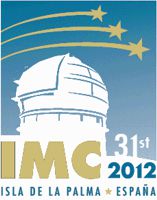Conference Topics
Possible meteor radio workshop?
Currently we check how many people would be interested to attend a radio workshop of either an entire day before the IMC or during Friday evening. Radio meteor workers are invited to contact Jean-Louis Rault (radio at imo.net) for more information.
Draconid workshop/session Friday afternoon 21 September 2012.
Friday afternoon will be entirely dedicated to the Draconid outburst of 2011 and the exceptional scientific research campaigns that were possible thanks to the accurate predictions. More information about the Friday afternoon Draconid session can be obtained from Jeremie Vaubaillon (vaubaill at imcce.fr).
Interested to present a paper or poster? Please read the following instructions:
The conference welcomes contributions in the field of meteor science and closely related topics. We particularly encourage presentations by amateur astronomers; both at beginner and advanced level! Contributions by professional astronomers are also highly appreciated.
| Lectures and posters must be announced when registering for the IMC participation, or should be communicated before the IMC in order to allow the IMC program to be planned. To optimize the planning of the IMC program we invite people with a presentation to provide us with a written paper version of their lecture or poster before the IMC. This will help us to determine the appropriate timing and duration of the presentation and will help with the timeliness of the IMC Proceedings that need to be prepared shortly after the IMC. Moreover a written paper version of any presentation will help you as lecturer or poster presentator to be better prepared with your lecture/poster. So please provide a written version of your presentation in the format of an article in WGN style, at the very least an abstract or summary should be submitted before the IMC. |
We suggest the following (non-exhaustive) list of topics:
Visual observations
- Observing campaigns: results and future plans
- Meteor shower analyses from visual data
- Results from the 2011 Draconids outburst
Video & photographic observations
- Observing campaigns: results and future plans
- Instrumentation and software
- Obtaining meteoroid flux from video counts
- Evaluation of algorithms for automated astrometry
- Telescopic observations
Radio observations
- Instrumentation and software
- Obtaining meteoroid flux from forward scatter counts
Fireball observations
- Collecting observations from the public
- Camera networks
- Meteorite recovery
Trajectory & orbit determination
- Results from double-station campaigns
- Comparison of trajectory determination algorithms
Stream modelling
- Predictions for future meteor showers
- Observing requirements for testing theoretical models
Parent bodies
- Parent body observations
- Parent body dynamics & fragmentation
Extraterrestrial meteors
- Observing lunar impact flashes
- Meteors in atmospheres of other planets
- Observing meteors from space
General remark: Presentations should be related to the domain of meteor astronomy, off-topic items cannot be admitted seen the specific aims of the conference. All presentations must be registered via the registration form and no unannounced topics will be admitted at the conference. All presentations must be in English.
